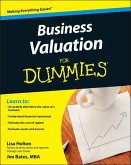Thomas L. West, Jeffrey D. Jones
Handbook of Business Valuation
Herausgeber: West, Thomas L; Jones, Jeffrey D
Thomas L. West, Jeffrey D. Jones
Handbook of Business Valuation
Herausgeber: West, Thomas L; Jones, Jeffrey D
- Gebundenes Buch
- Merkliste
- Auf die Merkliste
- Bewerten Bewerten
- Teilen
- Produkt teilen
- Produkterinnerung
- Produkterinnerung
46 Autoren haben diese 2. Auflage des 1992 erschienenen und bewährten 'Handbook of Business Valuation' komplett überarbeitet und um zwei neue Kapitel erweitert. Die Themen Dienstleistungs- und Technologieunternehmen werden ausführlicher behandelt; viele Kapitel wurden neu geschrieben bzw. aktualisiert. (07/99)
Andere Kunden interessierten sich auch für
![Principles of Private Firm Valuation Principles of Private Firm Valuation]() Stanley J. FeldmanPrinciples of Private Firm Valuation68,99 €
Stanley J. FeldmanPrinciples of Private Firm Valuation68,99 €![Business Valuation for Dummies Business Valuation for Dummies]() Lisa HoltonBusiness Valuation for Dummies21,99 €
Lisa HoltonBusiness Valuation for Dummies21,99 €![Equity Value Enhancement Equity Value Enhancement]() Carl L. SheelerEquity Value Enhancement82,99 €
Carl L. SheelerEquity Value Enhancement82,99 €![Financial Services Firms Financial Services Firms]() Zabihollah RezaeeFinancial Services Firms124,99 €
Zabihollah RezaeeFinancial Services Firms124,99 €![Financial Valuation, + Website Financial Valuation, + Website]() James R. HitchnerFinancial Valuation, + Website138,99 €
James R. HitchnerFinancial Valuation, + Website138,99 €![Business Valuation and Bankruptcy Business Valuation and Bankruptcy]() Ian RatnerBusiness Valuation and Bankruptcy72,99 €
Ian RatnerBusiness Valuation and Bankruptcy72,99 €![Business Valuation Discounts and Premiums Business Valuation Discounts and Premiums]() Shannon P PrattBusiness Valuation Discounts and Premiums140,99 €
Shannon P PrattBusiness Valuation Discounts and Premiums140,99 €-
-
-
46 Autoren haben diese 2. Auflage des 1992 erschienenen und bewährten 'Handbook of Business Valuation' komplett überarbeitet und um zwei neue Kapitel erweitert. Die Themen Dienstleistungs- und Technologieunternehmen werden ausführlicher behandelt; viele Kapitel wurden neu geschrieben bzw. aktualisiert. (07/99)
Hinweis: Dieser Artikel kann nur an eine deutsche Lieferadresse ausgeliefert werden.
Hinweis: Dieser Artikel kann nur an eine deutsche Lieferadresse ausgeliefert werden.
Produktdetails
- Produktdetails
- Verlag: Wiley & Sons
- 2. Aufl.
- Seitenzahl: 624
- Erscheinungstermin: 16. August 1999
- Englisch
- Abmessung: 240mm x 161mm x 38mm
- Gewicht: 1132g
- ISBN-13: 9780471297871
- ISBN-10: 0471297879
- Artikelnr.: 09371352
- Herstellerkennzeichnung
- Libri GmbH
- Europaallee 1
- 36244 Bad Hersfeld
- gpsr@libri.de
- Verlag: Wiley & Sons
- 2. Aufl.
- Seitenzahl: 624
- Erscheinungstermin: 16. August 1999
- Englisch
- Abmessung: 240mm x 161mm x 38mm
- Gewicht: 1132g
- ISBN-13: 9780471297871
- ISBN-10: 0471297879
- Artikelnr.: 09371352
- Herstellerkennzeichnung
- Libri GmbH
- Europaallee 1
- 36244 Bad Hersfeld
- gpsr@libri.de
THOMAS L. WEST is the publisher of the Business Broker and M&A Today, leading industry newsletters, and the author of numerous books. He is also the founder of United Business Investments, and co-founder and past president of VR Business Brokers and the International Business Brokers Association. JEFFREY D. JONES is founder and Chairman of Certified Business Brokers, founder and President of Certified Appraisers, and a designated senior member of the American Society of Appraisers (ASA) and the Institute of Business Appraisers (CBA). He currently serves as Editor of the IBBA Journal and as Chairman of the IBBA's Standards Committee.
THE PURPOSE, MARKET, AND RESOURCES FOR VALUING BUSINESSES.
Reasons for Value a Business and Who Should Do It.
Valuation Issues from a Seller's Perspective.
Valuation Issues from a Buyer's Perspective.
Valuation Issues from an Intermediary's Perspective.
The Investment Banker's Perspective on Due Diligence for Mergers,
Acquisitions, and Securities Offerings.
Valuation Issues from the Legal Perspective.
Valuation From the Lender's Perspective.
Notable Differences Between Middle Market and Small Businesses.
Where to Find Industry Information and Guideline Market Data.
VALUATION APPROACHES AND METHODS.
Recasting Financial Statements.
To Infinity and Beyond: Statistical Techniques Appraising the Closely Held
Business.
Machinery and Equipment Valuation Approaches and Methods Used in
Conjunction with a Going Concern Business.
Rules of Thumb: What They Are and How to Use Them.
The Direct Market Data Method of Valuing Midsize and Smaller Closely Held
Businesses.
The Market Approach Using Public Company Data.
The Excess Earnings Method.
Multiple of Discretionary Earnings Method.
Capitalization of Earnings: An Income Approach.
Discounted Future Benefits Method: An Income Approach.
VALUATION ISSUES BY INDUSTRY.
Valuing Retail Businesses.
Valuing Manufacturing Businesses.
Valuing Automobile Dealerships.
Valuing Restaurants.
Valuing Medical Practices.
Valuing Accounting Firms.
Valuing Radio and Cable TV Businesses.
Valuation of Hotels and Motels.
Valuing a Software Company.
Valuing Publishing Companies.
Valuing Home Healthcare Businesses.
Valuing Lumberyards and Home Centers.
Valuing Printing Businesses.
Valuing Home-Based Businesses.
Valuing Country Businesses.
SPECIAL ISSUES.
Perspectives on Valuing a Minority Interest in a Private Company.
Valuation for ESOP Purposes.
Valuing Family Limited Partnerships and Limited Liability Company Interests
for Estate Planning Purposes.
Valuing Intellectual Property.
Corporate Taxes and Valuation.
The Use and Abuse of Experts.
Index.
Reasons for Value a Business and Who Should Do It.
Valuation Issues from a Seller's Perspective.
Valuation Issues from a Buyer's Perspective.
Valuation Issues from an Intermediary's Perspective.
The Investment Banker's Perspective on Due Diligence for Mergers,
Acquisitions, and Securities Offerings.
Valuation Issues from the Legal Perspective.
Valuation From the Lender's Perspective.
Notable Differences Between Middle Market and Small Businesses.
Where to Find Industry Information and Guideline Market Data.
VALUATION APPROACHES AND METHODS.
Recasting Financial Statements.
To Infinity and Beyond: Statistical Techniques Appraising the Closely Held
Business.
Machinery and Equipment Valuation Approaches and Methods Used in
Conjunction with a Going Concern Business.
Rules of Thumb: What They Are and How to Use Them.
The Direct Market Data Method of Valuing Midsize and Smaller Closely Held
Businesses.
The Market Approach Using Public Company Data.
The Excess Earnings Method.
Multiple of Discretionary Earnings Method.
Capitalization of Earnings: An Income Approach.
Discounted Future Benefits Method: An Income Approach.
VALUATION ISSUES BY INDUSTRY.
Valuing Retail Businesses.
Valuing Manufacturing Businesses.
Valuing Automobile Dealerships.
Valuing Restaurants.
Valuing Medical Practices.
Valuing Accounting Firms.
Valuing Radio and Cable TV Businesses.
Valuation of Hotels and Motels.
Valuing a Software Company.
Valuing Publishing Companies.
Valuing Home Healthcare Businesses.
Valuing Lumberyards and Home Centers.
Valuing Printing Businesses.
Valuing Home-Based Businesses.
Valuing Country Businesses.
SPECIAL ISSUES.
Perspectives on Valuing a Minority Interest in a Private Company.
Valuation for ESOP Purposes.
Valuing Family Limited Partnerships and Limited Liability Company Interests
for Estate Planning Purposes.
Valuing Intellectual Property.
Corporate Taxes and Valuation.
The Use and Abuse of Experts.
Index.
THE PURPOSE, MARKET, AND RESOURCES FOR VALUING BUSINESSES.
Reasons for Value a Business and Who Should Do It.
Valuation Issues from a Seller's Perspective.
Valuation Issues from a Buyer's Perspective.
Valuation Issues from an Intermediary's Perspective.
The Investment Banker's Perspective on Due Diligence for Mergers,
Acquisitions, and Securities Offerings.
Valuation Issues from the Legal Perspective.
Valuation From the Lender's Perspective.
Notable Differences Between Middle Market and Small Businesses.
Where to Find Industry Information and Guideline Market Data.
VALUATION APPROACHES AND METHODS.
Recasting Financial Statements.
To Infinity and Beyond: Statistical Techniques Appraising the Closely Held
Business.
Machinery and Equipment Valuation Approaches and Methods Used in
Conjunction with a Going Concern Business.
Rules of Thumb: What They Are and How to Use Them.
The Direct Market Data Method of Valuing Midsize and Smaller Closely Held
Businesses.
The Market Approach Using Public Company Data.
The Excess Earnings Method.
Multiple of Discretionary Earnings Method.
Capitalization of Earnings: An Income Approach.
Discounted Future Benefits Method: An Income Approach.
VALUATION ISSUES BY INDUSTRY.
Valuing Retail Businesses.
Valuing Manufacturing Businesses.
Valuing Automobile Dealerships.
Valuing Restaurants.
Valuing Medical Practices.
Valuing Accounting Firms.
Valuing Radio and Cable TV Businesses.
Valuation of Hotels and Motels.
Valuing a Software Company.
Valuing Publishing Companies.
Valuing Home Healthcare Businesses.
Valuing Lumberyards and Home Centers.
Valuing Printing Businesses.
Valuing Home-Based Businesses.
Valuing Country Businesses.
SPECIAL ISSUES.
Perspectives on Valuing a Minority Interest in a Private Company.
Valuation for ESOP Purposes.
Valuing Family Limited Partnerships and Limited Liability Company Interests
for Estate Planning Purposes.
Valuing Intellectual Property.
Corporate Taxes and Valuation.
The Use and Abuse of Experts.
Index.
Reasons for Value a Business and Who Should Do It.
Valuation Issues from a Seller's Perspective.
Valuation Issues from a Buyer's Perspective.
Valuation Issues from an Intermediary's Perspective.
The Investment Banker's Perspective on Due Diligence for Mergers,
Acquisitions, and Securities Offerings.
Valuation Issues from the Legal Perspective.
Valuation From the Lender's Perspective.
Notable Differences Between Middle Market and Small Businesses.
Where to Find Industry Information and Guideline Market Data.
VALUATION APPROACHES AND METHODS.
Recasting Financial Statements.
To Infinity and Beyond: Statistical Techniques Appraising the Closely Held
Business.
Machinery and Equipment Valuation Approaches and Methods Used in
Conjunction with a Going Concern Business.
Rules of Thumb: What They Are and How to Use Them.
The Direct Market Data Method of Valuing Midsize and Smaller Closely Held
Businesses.
The Market Approach Using Public Company Data.
The Excess Earnings Method.
Multiple of Discretionary Earnings Method.
Capitalization of Earnings: An Income Approach.
Discounted Future Benefits Method: An Income Approach.
VALUATION ISSUES BY INDUSTRY.
Valuing Retail Businesses.
Valuing Manufacturing Businesses.
Valuing Automobile Dealerships.
Valuing Restaurants.
Valuing Medical Practices.
Valuing Accounting Firms.
Valuing Radio and Cable TV Businesses.
Valuation of Hotels and Motels.
Valuing a Software Company.
Valuing Publishing Companies.
Valuing Home Healthcare Businesses.
Valuing Lumberyards and Home Centers.
Valuing Printing Businesses.
Valuing Home-Based Businesses.
Valuing Country Businesses.
SPECIAL ISSUES.
Perspectives on Valuing a Minority Interest in a Private Company.
Valuation for ESOP Purposes.
Valuing Family Limited Partnerships and Limited Liability Company Interests
for Estate Planning Purposes.
Valuing Intellectual Property.
Corporate Taxes and Valuation.
The Use and Abuse of Experts.
Index.








